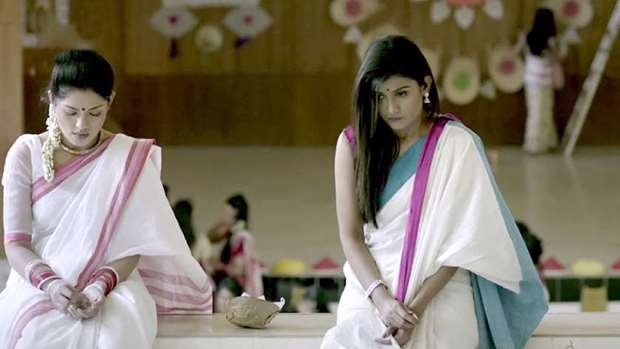When I met Indian actor Irrfan Khan recently, I was amazed to learn that he was following my writings. And he mentioned one where I had said that he must know the language of a film to be able to emote with conviction. “I quite agreed with what you wrote”, Khan had the disarming humility to accept my point of view.
This is what I had penned some time ago: “So, I was quite disappointed to note that one of India’s finest actors, Irrfan, when asked in a recent interview whether he would like to work in Tamil cinema said that he ‘can work in any industry’ provided he liked the script and the story. He cited the example of his recent work, Doob or No Bed of Roses, a Bangladeshi (Bengali) film. I watched that some weeks ago. Now, I have seen Irrfan in many other movies, but I did find a wee bit of difference in his acting in Doob. Obviously, he is not familiar with Bengali, although his wife speaks the language. I found something lacking in his performance. It did not display the same kind of feel which I have seen in his earlier works like The Lunch Box, Qissa, Paan Singh Tomar, Piku, Haider and so on. I can only put my finger here on his inability to comprehend the Bengali language”.
Now, the plot of Doob (by Mostofa Sarwar Farooki) reportedly runs close to the life of the late Bangladeshi author and film director, the iconic Humayun Ahmed – who divorced his wife of 27 years after falling in love with an actress 33 years younger to him.
Now, this is a story that must have played out in the lives of millions of men and women since time immemorial, and need not necessarily have been that of Ahmed alone. But Doob ran into censorship obstacles in Bangladesh.
In any case, as Farooki told me some time ago that many of his works had been inspired by real incidents. “My feature Television, which closed the Busan Film Festival in 2013, was based on a quarrel I had with my father as a boy when he threw out our TV set”, the director averred. “In our culture, television was considered ‘haram’...My debut creation, Bachelor in 2003, came when I was single, and it drew from my own experiences of bachelorhood and those of my friends”.
To me, there was nothing out of the way in Doob. It deals with extra-marital relationship – which the world over has caused rift and unpleasantness. We in India are seeing one now being played out in the Malayalam cinema industry – at least the aftermath of it all with actor Dileep now out on bail after having been charged with plotting the sexual assault of a well-known Kerala actress by hiring a “supari rapist”. The actress had allegedly warned Dileep’s former wife, Manju Warrier (also an actress), about his straying.
Doob comes at a time when Bengali cinema on both sides of the border (Bengal in India which lies next to Bangladesh) has been suffering for want of good themes, good plots and, more importantly, good performances. Farooki’s work meets some of these requirements with a fair degree of success. To begin with, it must have been a casting coup for the director when Khan agreed to act in Doob without much ado. Not just this, he also volunteered to co-produce the movie. So, it is a joint India-Bangladesh venture.
Farooki ensures that the film does not slip into melodramatic mishmash. It is visually enriching, and its unhurried pacing makes Doob a pleasure to watch – especially in times when moviemakers appear so anxious to speed up the narrative with the help of hyperactive cinematography and mindless inter-cuts in the desperate hope that it is only such a treatment which will help hold audience attention. But Doob is gripping without these.
Outgoing Javed Hasan (Irrfan) is dating his new lead actress, Nitu (Parno Mitra), incidentally a girl much younger to him and who was once his daughter, Saberi’s, classmate. When Hasan confesses this to his schoolteacher wife, Maya (Rokeya Prachy), she is shocked beyond belief. How can such a long marriage disintegrate like this. When Saberi, essayed by Farooki’s pretty looking wife, Nusrat Imrose Tisha, finds out about her father’s romance, she stops talking to him – leading to an emotional upheaval in the family with tragic consequences.
Although, Doob has a certain class which sets it apart from the kind of mindless movies we see so often these days, the story by itself has very little novelty to offer. In fact, as recently as 2010, the late Rituparno Ghosh (who worked out of Kolkata) had made Abohomaan – where Deepankar Dey portrays the angst and anguish of a film director who falls in love with an actress, who is as old as his son. The movie shows how his wife (Mamata Shankar) faces this turbulence at home so stoically.
Nonetheless, this is not to rob Doob of its well deserved credit as a work which engaged me with its subtleties and a fine sense of balance. It must have called for enormous guts to create a work with such huge emotional undercurrents without tear-jerkers or slanging scenes. In a sense, Doob almost looks like a narrative drawn out of a Western home – where distress and disappointment are not allowed to create fireworks.
Yes, Doob is engaging, but Irrfan’s lack of Bengali language skills does play spoilsport to some extent certainly.
*Gautaman Bhaskaran has been
writing on Indian and foreign cinema for close to 40 years, and may be e-mailed
at [email protected]

PLEASING: A scene from the film. Its unhurried pacing makes Doob a pleasure to watch.
